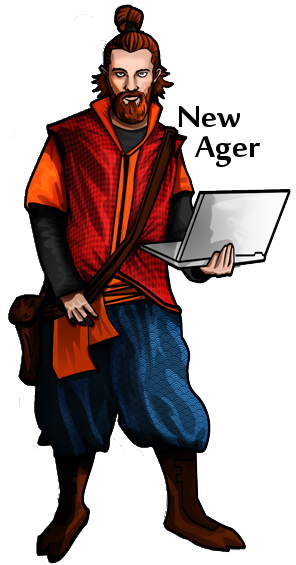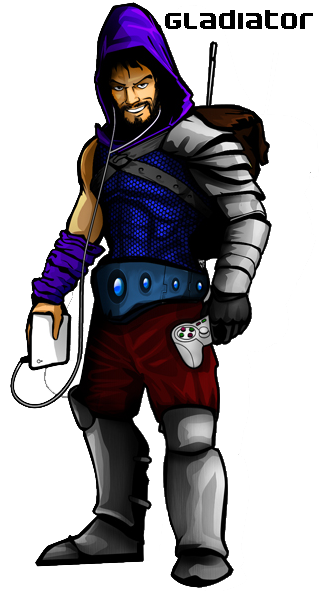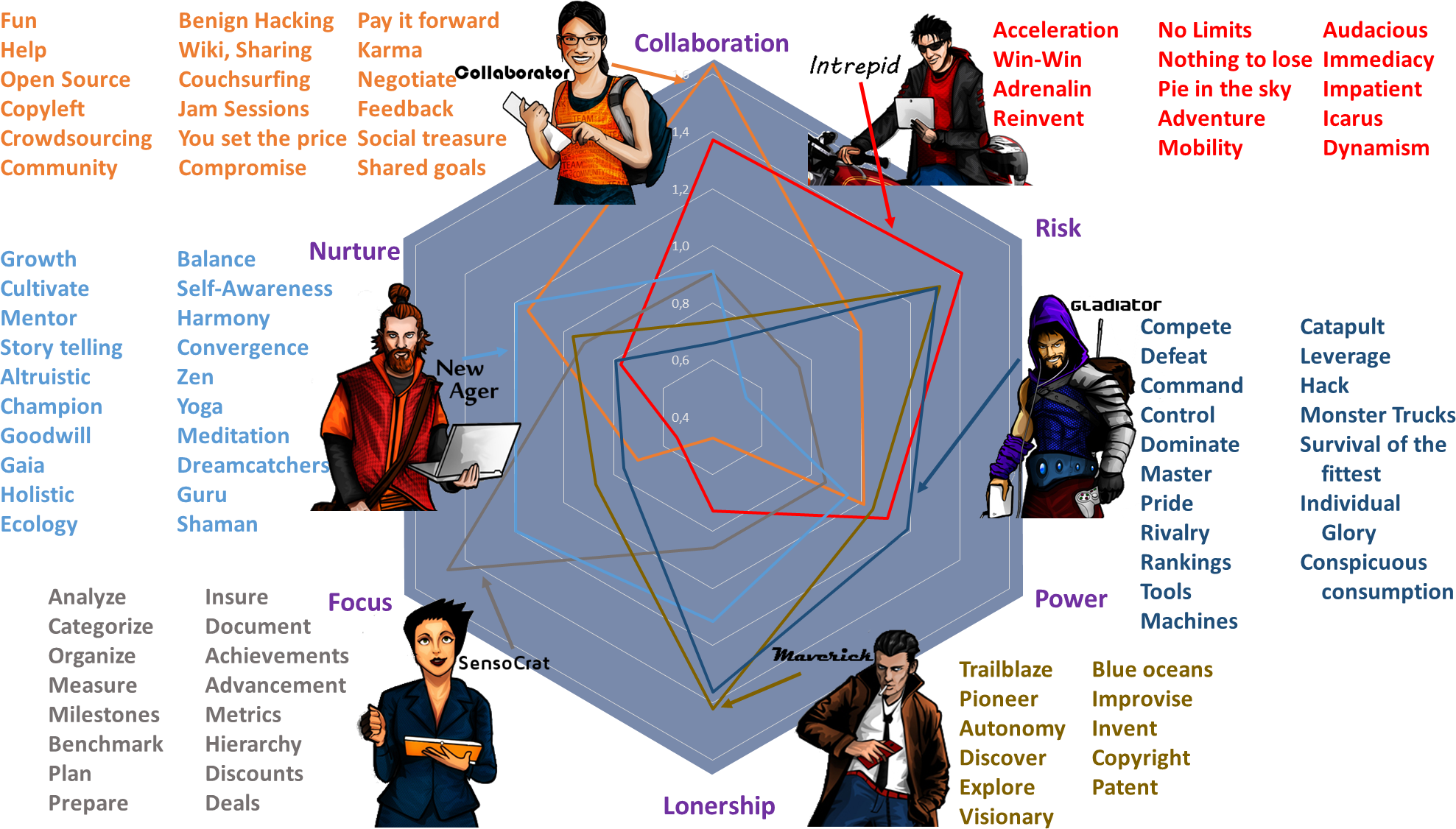In this unique quantitative study we explored digital lifestyles + our social and motivational psyches, creating a typology that I call Digi-Psychographic, which has been used by digital agencies in Spain to create systems, programs and platforms for socialization, gamification and motivation, with applications to a great variety of areas, including games, HR management, teamwork, teaching, training, coaching, loyalty programs, market research, co-creation and collaborative innovation.
In summary, if you want to motivate, drive loyalty, acquire new customers, engage, reward, optimize teams, teach or inspire, our digi-psychographic profiling will discover the best motivational mix and mechanics for your ecosystem of users, clients, employees, providers, collaborators, etc.
Key to understanding these profiles are the 6 psychographic indexes that summarize their main motivations and behavioral drivers, according to which we may map out the 6 discovered profiles, with their associated keywords:

Unlike the other profiles, Collaborators aren’t looking so much for concrete rewards, but rather value discovering something new even though it doesn’t provide any tangible reward beyond just the thrill of discovery itself. It is the most sociable of all the profiles, with a real love for collaborating, helping and working as part of a team. They especially look for recognition and friendship, valuing smiles more than medals or stars. While they like to work in teams they prefer to do their work at their own rhythm, and if they are given the option they’ll work only 30 hours a week despite earning less. They are the profile that is most into TV and cinema, they tend to use social networks every day and are the most frequent users of Facebook, Youtube and Twitter. They respond well to game mechanics such as levels, quests, medals and even virtual rewards, and they are especially fond of simulation videogames such as Farmville and The Sims. They are equally divided between men and women, and are a bit younger on average.

Unlike Collaborators, Intrepids are much more likely to be looking for rewards and focusing on concrete goals, and they love the challenge of getting something done in a record time. Their tolerance of risk is the highest of all the segments, with a high disposition to risk everything for the promise of a fast and big success. This has a lot to do with their youth as they are the youngest profile on overage. Many are students and they are the profile that is most willing to work overtime in exchange for more remuneration. They are multi-taskers and get motivated by the challenge of pursuing various goals at once. And they are also sociable, actively interacting with a wide circle of friends and contacts in social networks. They like to work in teams and are willing to depend on others, valuing more their friendship than their respect. They are really fond of videogames, especially games with Puzzles, and in general they get really motivated by all kinds of game mechanics.

SensoCrats derive their name from “Sensible” + the suffix “Crat” which means “ruled by”, because SensoCrats are ruled by all that is sensible, pragmatic and rational. Above all they look for concrete rewards and have little use for discovering something just for the thrill of discovery alone. And though they are highly focused on getting concrete rewards they have little appetite for assuming risks to get them. They only really want to go after sure things, and if they have to journey into unknown territory they would rather have a guide than go exploring by themselves. And while they do like the comfort of working on a team, they are not so much team-players as they prefer to work at their own pace and not have to depend on others. On social networks they tend to only interact with a small circle of intimate friends and family, with a relative fondness for LinkedIn. What they are really fond of is TV, watching above all crime, medical and comedy shows. In videogames they are especially fond of Puzzle and Multiplayer games, and if they have a game console it is most likely a Wii. In general they are the profile that gets least motivated by game mechanics, but they do have a soft spot for gifts and discounts. They are more women and the profile mostly likely to possess higher degrees. Also, they are the profile with the most cards and programs for earning points for purchases in shops, and those who most surf the net with a tablet.

New Agers value discovering something just for feeling the thrill of discovery, however, they are not really into free-form exploration without a determined end, but rather tend to focus on near-term objectives, gentle nurturing projects and people to see them grow little by little. They would rather negotiate peace than defeat their enemy, always looking for calm and security, and they’re really enthused to help others. They put a high value on originality and creativity, but at the same time they like to play and work within environments with at least a minimum of structure where the rules are clearly defined. In general they are the profile that is least fond of TV, videogames and social networks, which they tend to use but less frequently than the others. They like to give a receive feedback and respond especially well to game mechanics such as progress bars and systems for making comments. They have the highest age average overall of all the profiles, and are more men. With their years of experience and enthusiasm for helping others, New Agers perform especially well in mentorship roles.

Mavericks put great value on originality, creating for oneself, and discovering something for the mere thrill of discovery. In this they are similar to New Agers, however, they are much more likely to prefer winning themselves than helping others, and they are much more into tackling really difficult problems that few can solve, much more willing to take risks, and they would prefer to not have to depend on others. In general they have little fondness for videogames and social networks, where they tend to interact with a small circle of intimate friends, family and professional contacts that they know personally, especially on LinkedIn, and they have a relative fondness for Leaderboards. They are more men, slightly older than the overall average, and nearly all have advanced degrees.

Gladiators love making a big effort to achieve something that is really difficult and beyond the reach of most, and creating for themselves. They prefer to not have to depend on others and, in fact, would prefer to earn the respect of others than their friendship. Neither do they want to depend on a guide, preferring to explore in their own way, but their exploration is highly directed towards achieving concrete goals and earning real rewards, for which they are willing to take calculated risks. They are multi-taskers, pursuing various goals at once, and very likely to be found playing videogames, especially Action type games, while they use the computer and watch TV all at the same time! In terms of game mechanics the only ones that really motivate them are those that can be exchanged for tangible rewards. They are more men, somewhat younger than average, and they are the profile that most works and studies simultaneously. They usually have a frequent traveler loyalty card, are the profile most fond of online shopping loyalty programs and online stock trading, and they tend to have a wide circle of contacts in social networks where they are highly active.
———————————————————————–
This profiling has been elaborated via a CAWI questionnaire completed in Spring 2015 by 503 Spanish-speaking users of the internet who reside in Spain, with a sample error of 4.4% at a 95% confidence level. The profiling methodology is inspired by several major psychological and gaming theories and models, including Jung’s Psychological Types, Myers-Briggs Type Indicator (MBTI), Visual, Auditory and Kinesthetic (VAK) learning style model, The Bartle Test of Gamer Psychology, Andrzej Marczewski’s User Type Hexad, and Yu-kai Chou’s User and Player Types in Gamified Systems.
